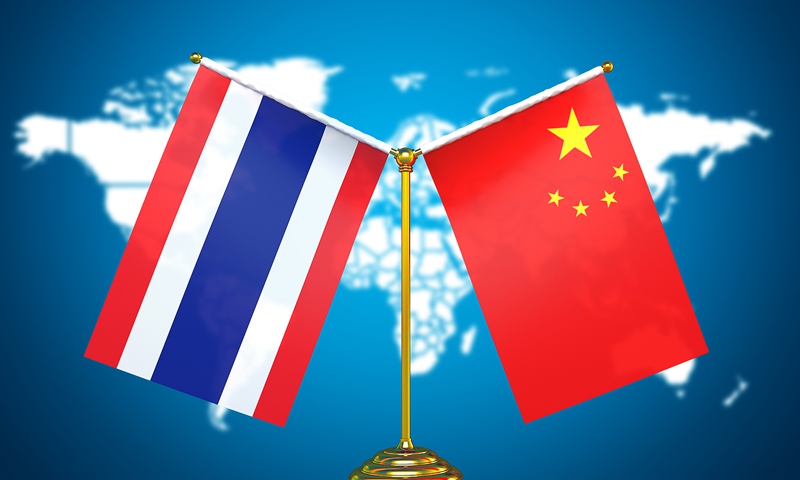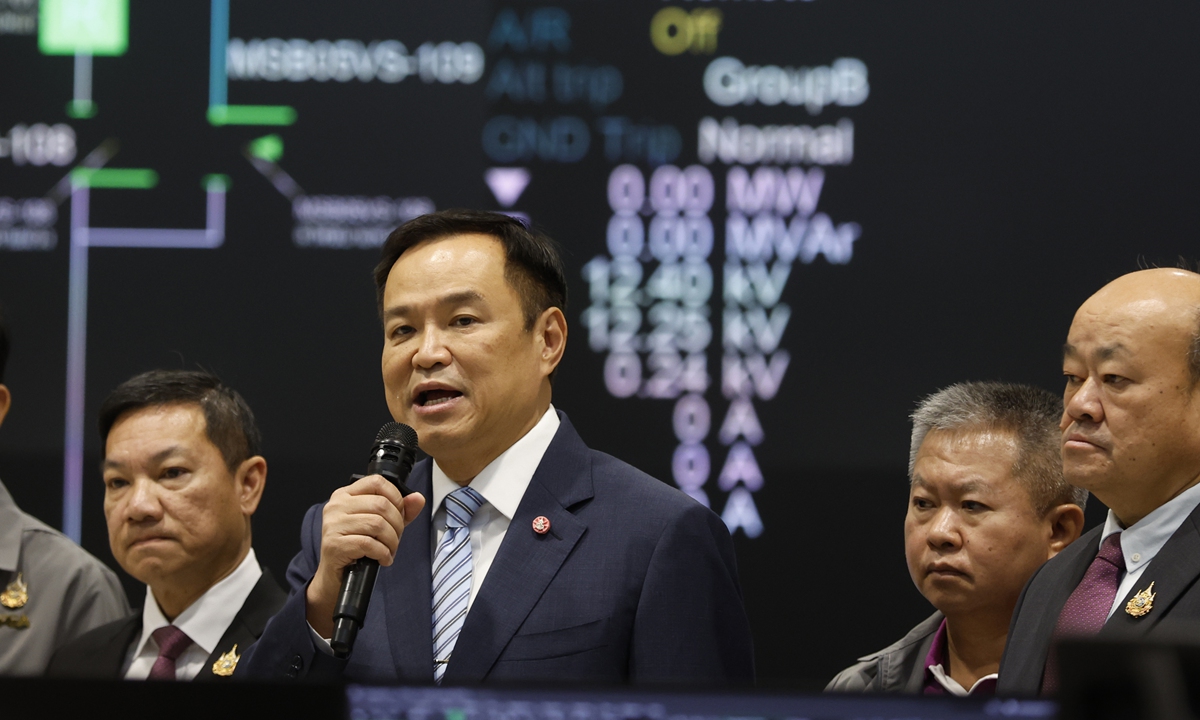
China Thailand Photo: VCG
Prime Minister of Thailand Paetongtarn Shinawatra arrived in Beijing on Wednesday for an official visit to China. The Thai leader’s visit came on the same day as Thailand began cutting electricity, fuel and internet services to areas in Myanmar along Thailand-Myanmar borders to tackle online fraud, an issue believed to be high on the agenda during the prime minister’s visit.
At the invitation of Chinese Premier Li Qiang, Paetongtarn Shinawatra is scheduled to pay an official visit to China from February 5 to 8, a foreign ministry spokesperson announced on Tuesday.
This is Paetongtarn’s first official visit to China since assuming office in August 2024. Paetongtarn’s visit is expected to promote cooperation between Thailand and China, celebrate the 50th anniversary of diplomatic relations, and restore the confidence of Chinese tourists in traveling to Thailand, the Xinhua News Agency reported.
In response to a question on Paetongtarn’s visit and Thailand’s move to cut off the supplies, Chinese Foreign Ministry spokesperson Lin Jian said on Wednesday that on the recent string of cross-border telecom fraud and other vicious cases along the Thailand-Myanmar border, China attaches great importance to it and made persistent effort to ask relevant countries to jointly find solutions through consultation.
China welcomes the robust measures by relevant country. We stand ready to work with Thailand and other countries to beef up law enforcement cooperation, crack down on online gambling and telecom fraud, protect the safety of Chinese citizens overseas and their lawful rights and interests, and keep normal cross-border exchanges between China and relevant countries in order, Lin said at a regular press conference on Wednesday.
According to the Bangkok Post on Tuesday, the Thai prime minister said that during her visit to China, she will ask for China’s help in curbing negative rumors about safety in Thailand. Online financial scams, tourism and pollution will be among the issues discussed, Reuters reported.
Thailand’s Provincial Electricity Authority (PEA) began cutting power to five border areas in Myanmar on Wednesday morning amid suspicions that call-center scam gangs were operating there. Thai authorities also halted oil supply and broadband internet access to the affected areas in what is seen as an effort to strengthen ties with China, local media Nation Thailand reported.

Thai Deputy Prime Minister and Interior Minister Anutin Charnvirakul speaks as he oversees the shutdown of power supplies to scam operations across the Thailand-Myanmar border at the Provincial Electricity Authority (PEA) headquarters in Bangkok, Thailand, on February 5, 2025. Photo: VCG
The decision came after a National Security Council meeting on Tuesday during which Thai senior officials concluded that the security threat justified decisive action against the criminal gangs. The activities of the scam gangs have had a huge impact on the Thai people and on the national image, Paetongtarn said on Tuesday, according to the Bangkok Post.
Online fraud and related kidnapping, highlighted by the recent missing and rescue of Chinese actor Wang Xing, sparked concern and dampened Chinese people’s enthusiasm for traveling to Thailand, analysts said. Wang was lured by a promise of an acting opportunity and traveled to Thailand but instead was taken across the border into Myanmar. He had been trapped in Myawaddy, one of the areas affected by the cutoffs, before being rescued.
Xu Liping, director of the Center for Southeast Asian Studies at the Chinese Academy of Social Sciences, told the Global Times on Wednesday that Thailand’s cutoffs can be seen as showing its resolve to address the fraud issue and a sign of goodwill before the prime minister’s visit.
Underlining the joint tackling of online fraud as a key agenda, Gu Xiaosong, dean of the ASEAN Research Institute of Hainan Tropical Ocean University, told the Global Times that more communication and cooperation are needed between security, police and tourism departments of the two countries.
To solve the problem is not only important for Thailand and China, but also for regional security and healthy economic development, Gu said.
As one family
Gu cited the concept of “China and Thailand as one family,” saying there is a solid foundation for bilateral friendship and exchanges.
During the visit, Paetongtarn will meet with Chinese and Thai business executives to further strengthen the business partnership between the two countries. Following the official meetings in Beijing, she will travel to Harbin to attend the opening ceremony of the 9th Asian Winter Games, according to the Thai Foreign Ministry.
Nation Thailand reported that China and Thailand will ink 15 memoranda of understanding (MOU). Seven of them have been approved by the Thai cabinet and involve cooperation in fish product exports, artificial intelligence (AI), higher education, postal services, investment in the digital economy, and green energy, while the other eight do not require cabinet approval.
China-Thailand relations feature high-level political trust, close cultural and people-to-people exchanges, and strong economic cooperation, Xu said, pointing to interconnectivity, new energy vehicles (NEV) and digital economy as fields of great potential for further cooperation.
The Thai cabinet on Tuesday formally approved the second phase of the Thai-Chinese high-speed train line, from Nakhon Ratchasima to Nong Khai, with an investment of about 340 billion baht ($10 billion), the Bangkok Post reported.
The line would link up with the Bangkok-Nakhon Ratchasima first phase now under construction, allowing for fast travel from the Thai capital to Yunnan Province in China via Laos where a high-speed line is already operating.
Xu said the railway project will not only benefit both China and Thailand, but also boost regional integration, injecting vitality into trade and facilitate the development of industrial parks along the routes.
Chinese NEVs took over 80 percent of the market in Thailand and carmakers including BYD have opened plants in the country. Xu believes the two sides can deepen cooperation on industrial and supply chain in this industry.
The digital economy represents the direction of green transition and the development of AI, robotics, smart e-commerce and smart city projects have great potential, Xu said.
Taking the 50th anniversary of the diplomatic ties as an opportunity, China stands ready to work with Thailand to deepen cooperation in such areas as trade and investment, connectivity, sci-tech innovation and culture and education, and strive for more fruitful outcomes in our enduring friendship in the next five decades to come, spokesperson Lin Jian said in a press briefing on November 20, 2024.
link
